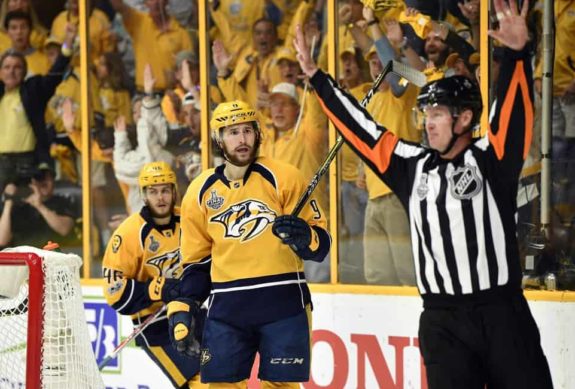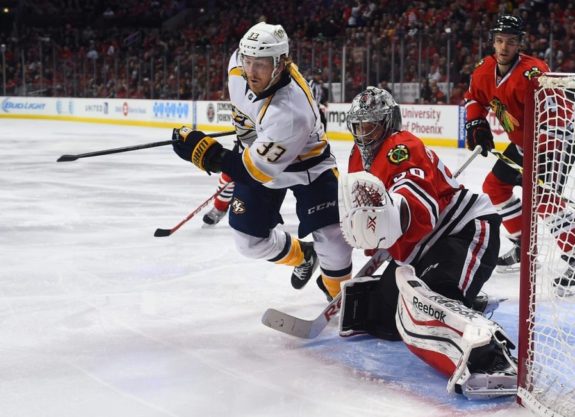When the National Hockey League altered its Stanley Cup Playoffs format five seasons ago, the changes arguably created more problems than they solved.
It’s stupid. It’s the stupidest thing ever. It doesn’t work. It doesn’t make sense. – Daniel Winnik
Originally modified in order to generate a greater number of interdivisional clashes, the NHL’s adjustments have instead created an unnecessarily complex system which fails to reward the regular season success of numerous franchises. Further, the alterations imposed have ensured that a number of the league’s top teams are now eliminated in the opening round of the playoffs, effectively robbing the postseason of true best-on-best matchups in later rounds in favour of immediate regional rivalries.

What’s more is that it is not only the NHL’s fans who have voiced their displeasure, as general managers, as well as the players themselves, have made their perspectives regarding the format well-known. Even now as we meander towards the conclusion of the 2017-18 season, the criticism surrounding the NHL’s current playoff format has once again begun to surface — serving as a painful reminder of the flawed system which looms overhead.
As a result, the time has come to propose something new and different.
In fact, it has come time for the NHL to institute major changes to its playoff format in order to reward regular season success and ensure a variety of rarely-before seen matchups in the process.
The inspiration behind these changes? The Southern Professional Hockey League.
A Fresh and Flashy Format
If you had yet to learn of the SPHL’s existence, that is about to change.
Are you a fan of the NHL’s 3-on-3 overtime format?
Well, you can thank the SPHL, as they were the first league to implement the thrilling overtime system and reap the immense benefits of its success. Now, the SPHL has made drastic changes to its playoff formatting — alterations which the NHL should seriously consider implementing.
SPHL announces new 2017-2018 playoff format | SPHL Southern Professional Hockey League https://t.co/tfaJxSGyRB
— SPHL (@SPHL) October 16, 2017
First and foremost, let’s examine the basis of the SPHL’s new playoff format and how it could be applied at the NHL-level.
A Thrilling First Round
To begin, forget the presence of wild cards. In fact, toss those right out of the window.
In this endlessly enthralling format, the NHL would revert to a conference-based system which ranks teams 1-through-8 based on their respective regular season success. From this point, the teams who placed in first, second, and third place within their conference would be afforded the opportunity to choose their first-round opponent — with the top team holding priority.
“I immediately knew this was the greatest idea I'd ever heard.” https://t.co/Cr5v4V7lqS
— SI NHL (@SI_NHL) March 10, 2018
After each conference’s top three teams had selected their first round challenger, the fourth-place team would then battle the remaining playoff contender yet to be selected. What’s more is that, if adopted, the NHL could televise and promote the selection process — drawing a great deal of interest and discourse from fans and media in the process.
Rounds Two Through Four
Following the conclusion of an incredibly unpredictable opening series, rounds two through four would proceed based on each conference’s original standings, much like they did from 1994-2013. So, if the first and eighth-placed teams within the Eastern Conference both ascended to the second round, the two combatants would battle one another given their regular season standings.
The Bevy of Benefits
While these potential changes to the NHL’s existing playoff format would be wide-ranging, so too would the benefits derived as a result.
Firstly, and most importantly, implementing this system would once again reward the regular season’s top teams, who would benefit from the ability to select their opening round opponent. Although this privilege may seem insignificant, it would provide select organizations with the ability to avoid a hot opponent or one which a team had struggled mightily against in recent history.

Further, instilling this format would be downright entertaining.
Although a Stanley Cup-bound team would still have to defeat the toughest of competition en route to a championship, creating unpredictability in the opening round would allow for never before seen matchups to occur and, potentially, new rivalries to materialize in the process.
A Quick Case Study
The 2017 Stanley Cup Playoffs stand as an excellent case study with regards to these potential playoff formatting changes.
Come to the end of the 2016-17 season, the Chicago Blackhawks led the Western Conference with 109 points — a standing which facilitated a first-round clash with the Nashville Predators. Having won 14 of their previous 20 games against the Predators, a Blackhawks’ series win appeared to be well in hand.

However, the Predators entered the postseason ablaze, having won six of their previous ten games while outscoring their opposition heavily in the process. So, although Chicago had enjoyed a substantial amount of success against Nashville in recent history, the Blackhawks could very well have opted to play a team such as Calgary Flames — who they had handled with ease in the regular season.
Unfortunately for Chicago, the ferocious Predators dismantled their promising Cup run in just four games, outscoring the ‘Hawks 13-3 alongside a pair of shutout performances.
Potential Drawbacks?
To be rather blunt, there aren’t any.
Although there would surely be a minor amount of disdain following the implementation of the changes outlined above, it would take little time for the format to gain traction with NHL’s general managers and its players. In fact, general managers would likely welcome the alterations made to the formatting of the first round, as it would provide their team — provided they finish in the top-three of their conference — with the prime opportunity to embark upon a long postseason run.
Yes, there would be a slight learning curve, however, moving to the system outlined above would mark a return to a sensible conference-based format which rewards regular season success.
If the NHL were to adopt this format, it would provide the league’s best teams with an equal opportunity to capture the Stanley Cup. Sure, any given team must defeat the NHL’s most fierce competition in order to capture the Cup, however, eliminating elite teams in the opening round of the postseason does not bode well for the league, its disgruntled franchises, or their passionate yet perturbed fanbases.
Get ready to, hopefully, once again praise the creativity of the SPHL.